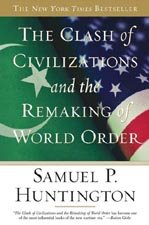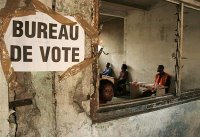The Clash of Civilizations, or the Clash about Civilizations?
By Otto Spijkers
 The title of Tony Blair’s first speech on foreign policy in the twenty-first century is “The Clash about Civilisations”. This reminds one of “The Clash of Civilisations”, a concept made famous by Samuel P. Huntington in his article in Foreign Affairs in the summer of 1993 ('Huntington, 1993'), later worked out in more detail in his book The Clash of Civilizations and the Remaking of World Order (1996). Is the clash of today's world a clash of or about civilizations?
The title of Tony Blair’s first speech on foreign policy in the twenty-first century is “The Clash about Civilisations”. This reminds one of “The Clash of Civilisations”, a concept made famous by Samuel P. Huntington in his article in Foreign Affairs in the summer of 1993 ('Huntington, 1993'), later worked out in more detail in his book The Clash of Civilizations and the Remaking of World Order (1996). Is the clash of today's world a clash of or about civilizations?
Before answering that question, I will first explain what the clash of civilizations means. In short,
In an interview of
 Now what about this new concept, this clash about civilization? The basic thesis of the first speech by Tony Blair (picture) was “that the defining characteristic of today's world is its interdependence; that whereas the economics of globalisation are well matured, the politics of globalisation are not; and that unless we articulate a common global policy based on common values, we risk chaos threatening our stability, economic and political, through letting extremism, conflict or injustice go unchecked.” What are these common values Mr. Blair speaks about? In his second speech on foreign policy, entitled 'Global alliance for global values', Mr. Blair says: “We know the values we believe in: democracy and the rule of law; also justice, the simple conviction that, given a fair go, human beings can better themselves and the world around them.” (In his third speech, Mr. Blair lists the following global values: "liberty, democracy, tolerance, justice. These are the values we believe in. These are the values universally accepted across all nations, faiths and races, though not by all elements within them. These are values that can inspire and unify".) And he adds: “We believe that the changes happening in the world that make it more integrated, the globalisation that with unblinking speed re-shapes our lives, is an opportunity as much as a risk. We are open societies. We feel enriched by diversity. We welcome dynamism and are tolerant of difference.” In other words: the increasing interdependence in the world provides a unique opportunitiy to spread our common values, such as democracy and the rule of law.
Now what about this new concept, this clash about civilization? The basic thesis of the first speech by Tony Blair (picture) was “that the defining characteristic of today's world is its interdependence; that whereas the economics of globalisation are well matured, the politics of globalisation are not; and that unless we articulate a common global policy based on common values, we risk chaos threatening our stability, economic and political, through letting extremism, conflict or injustice go unchecked.” What are these common values Mr. Blair speaks about? In his second speech on foreign policy, entitled 'Global alliance for global values', Mr. Blair says: “We know the values we believe in: democracy and the rule of law; also justice, the simple conviction that, given a fair go, human beings can better themselves and the world around them.” (In his third speech, Mr. Blair lists the following global values: "liberty, democracy, tolerance, justice. These are the values we believe in. These are the values universally accepted across all nations, faiths and races, though not by all elements within them. These are values that can inspire and unify".) And he adds: “We believe that the changes happening in the world that make it more integrated, the globalisation that with unblinking speed re-shapes our lives, is an opportunity as much as a risk. We are open societies. We feel enriched by diversity. We welcome dynamism and are tolerant of difference.” In other words: the increasing interdependence in the world provides a unique opportunitiy to spread our common values, such as democracy and the rule of law.
Is the clash of today's world a clash of or about civilizations? Huntington said in his article that "the efforts of the West to promote its values of democracy and liberalism as universal values [...] engender countering responses from other civilizations". “The struggle in our world today”, says Mr. Blair in his second speech, “is not just about security, it is a struggle about values and about modernity - whether to be at ease with it or in rage at it. To win, we have to win the battle of values, as much as arms. We have to show these are not western still less American or Anglo-Saxon values but values in the common ownership of humanity, universal values that should be the right of the global citizen.” This is the best way to fight those who oppose civilization (terrorists). In his third speech, Mr. Blair says: "We have to attack not just [global terrorism's] methods but its ideas, its presumed and false sense of grievance against the West, its attempt to persuade us that it is we and not they who are responsible for its violence. In doing so, we should stand up for our own values, asserting that they are not Western but global values, whose spread is the surest guarantee of our future security." The battle is not between different civilizations; it is a battle about civilizations, i.e. a battle of civilizations against their opponents.







